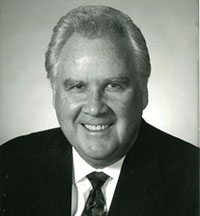Baptists who celebrate the 400th birthday of their denomination in 2009 miss the mark by about 1600 years, some Baptists insist.
Since Jesus founded his church during his earthly ministry and promised “the gates of hell shall not prevail against it,” Landmark Baptists believe that means an unbroken line of church succession dating back to Christ’s lifetime. And since John the Baptist immersed Jesus, the church Christ formed was a Baptist church, some add.
“Landmarkers believe that Jesus meant literally that his church would continue in an unbroken lineage until he returned,” said John Penn, church history instructor at Missionary Baptist Seminary in Little Rock, Ark.
Landmark Baptists hold to their belief in church succession out of commitment to the veracity of Scripture and the claims of Christ, said Philip Bryan, president emeritus of Baptist Missionary Association Seminary in Jacksonville.
|
Books by J.R. Graves, J.M. Pendleton and Joe T. Odle kept the Landmark view of Baptist history in circulation.
|
“The traditional Landmark Baptist position on the origin and continuation of the Lord’s church is essentially one of doctrine and theology rather than history,” Bryan said.
Baptists in perpetuity
Landmarkers believe in the perpetuity of the church Christ instituted—“that there has never been a day since Christ founded his church when there was no scriptural church on earth, and that the church shall continue in existence until he comes again,” he explained.
J.R. Graves spread Landmark Baptist teaching throughout the South and Southwest in the 1850s as editor of the Tennessee Baptist.
J.M. Pendleton perpetuated it for many generations through his Church Manual, a book still in print and sold by LifeWay Christian Stores.
Sign up for our weekly edition and get all our headlines in your inbox on Thursdays
In the mid-20th century, Joe T. Odle of Mississippi taught the same principles in his Church Members Handbook, a popular booklet published by Broadman Press and used in Baptist Training Union classes throughout the South.
“No man this side of Christ can be named as the founder of Baptists. Nor can any date this side of his personal ministry, nor any place outside of Palestine, be set for their beginning,” Odle wrote.

Many Landmark Baptists hold to the “Trail of Blood” teaching popularized by J.M. Carroll—the belief that persecution was the mark of the true church throughout Christian history. W.H. Whitsitt was forced to resign from Southern Baptist Theological Seminary in 1899 for daring to contradict unbroken succession.
In addition to an unbroken line of succession back to New Testament times, Landmark Baptists also believe in the primacy of the local church as the only biblical missionary-sending body and in closed communion—limiting the Lord’s Supper just to Baptists or even to members of a specific Baptist congregation.
Landmarkers believe the true church that has existed since the time of Christ has not always borne the “Baptist” label, but it has exhibited certain distinguishing marks testifying to its validity. And for much of church history, one of those marks has been persecution.
The distinctive of persecution
“After the union of church and state, it is contrary to the teaching of Christ that any so-called church that enforced his teaching by persecution—that is, by physical punishment, jailings and beatings—could be considered his true church,” Penn said.
“Landmarkers prefer to trace true succession through those groups who were persecuted than by those who inflicted physical suffering and death. … These groups were not called Baptists, but they bore the burden of preaching the truth.”
Some of the dissenting Christians who were persecuted by the state church held “some strange or even heretical views,” Penn acknowledged.
“However, it is also to be observed that they had their books burned, their houses pillaged, their Bibles confiscated and their children taken from them. Yet, in spite of this, they maintained a true witness,” he said. “These dissenters kept the faith and passed it on to us.”
Some Landmark Baptist historians note that while modern Baptists certainly do not hold identical views to Novatians, Waldenses and other ancient Christian groups who rejected infant baptism, they also differ significantly from early English Baptists, who did not practice baptism by immersion until about 1641.
“Assuming the validity of the Baptist belief that baptism by immersion is an absolute necessity for scriptural baptism, the accounts of the baptisms of John Smyth, the earliest Particular Baptists prior to the 1640s and even of Roger Williams disqualify such people from originating or continuing Baptist churches,” Bryan said.
Gaps in the historical records require believers in any theory of Baptist origins to make a leap of faith, he insisted.
“We cannot show conclusively how modern Baptists sprang from the people who are usually believed to be the founders of the Baptist movement,” he said.
“Those people were about 1,600 years late.”














We seek to connect God’s story and God’s people around the world. To learn more about God’s story, click here.
Send comments and feedback to Eric Black, our editor. For comments to be published, please specify “letter to the editor.” Maximum length for publication is 300 words.